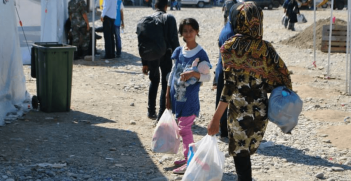Book Review: The Ethics of Exile: A Political Theory of Diaspora

The Ethics of Exile: A Political Theory of Diaspora tells a different story of migration. Ashwini Vasanthakumar reveals the stories of ordinary exiles, showcasing their political agency and moral complexity, that are rarely told in histories written by the powerful.
Ashwini Vasanthakumar is a political and legal theorist with a research interest in migration, the ethics of resistance, political obligation, and authority. She pursued an education in political theory and law and has almost a decade of academic experience at respected institutions. She has published several accounts of political resistance, borders, and citizenship. This expertise in political philosophy led her to apply a normative lens to the transnational politics of exiles in her first manuscript, The Ethics of Exile: A Political Theory of Diaspora.
The main arguments in the book are twofold. The first is that exiles have rights and responsibilities in the communities that they have left behind. The second is that exiles play different roles as moral and political agents in the politics of their homeland. Vasanthakumar further argues that there are two functions that can be performed by exiles from afar. First, exiles can work to ameliorate the defects of political institutions back home. Second, exile may mitigate the asymmetry of power in the international domain by providing a buffer between communities in their home countries and international actors involved in intervention or providing humanitarian assistance. The book also exemplifies how exiles navigate complex political structures at local, national, and international levels as well as how their political efforts are constantly at risk of co-optation by powerful state and non-state actors.
The concept of exiles is the nucleus of this book. In chapter two, Vasanthakumar defines exiles by drawing on three main criteria. First, exiles are those who are territorially absent from their homeland. In this case, a homeland could be a state, a sub-state space, or a community. The second criterion that defines an exile is the way in which they are forced to leave their homeland due to political pressure and turmoil. Finally, exiles are those who are politically oriented towards their homelands. This criterion is often evidenced by their aspirations to return.
Drawing from secondary data and multiple contemporary case studies from the Tibetan diaspora to the Chilean diaspora, the book presents six roles that exiles perform as political agents trying to solve the asymmetric relationship between powerful states and communities undergoing political crises. The six roles include exiles as witnesses, solidary intermediaries, co-authors, stakeholders, representatives, and principled disobedients. The case studies illustrate how exiles live in a local structure of their new home, but their works carry important global ramifications. Following the case studies in chapters three to eight, Vasanthakumar presents rigorous theoretical and conceptual discussions of each political role performed by exiles.
As the six political roles described in the book are illustrative rather than exhaustive, the research behind the book inquires into the discovery of different roles that exiles might perform in transnational political spaces as well as in the countries where they are physically settled. The six roles of exiles are articulated in a flowing order through the organisation of the chapters. Chapter three begins by outlining the minimal duty to assist those who are left behind, which focuses on the role of exiles as witnesses as they possess first-hand knowledge of injustice and experienced persecution in their homeland. Chapter four and chapter five highlight two important roles that exiles play as the result of two bases of collective action: acting from solidarity and acting from shared identity. Chapter six presents exiles as stakeholders who need not to prioritise the preferences of those left behind, but instead are expressing their own political preferences and agenda in their home country. Meanwhile, in chapter seven, we see the mechanisms by which exiles become valid political representatives outside their home country. Lastly, chapter eight explores disruptive protest and principle disobedience as methods in exile politics.
The inclusion of both refugees and diaspora groups under ‘exile’ as an umbrella concept helps us draw a parallel between these two groups of migrants in their transnational political mobilisation. However, this categorisation does not come without a cost. When it comes to future research on the political strategy and action adopted by exiles, a sub-categorisation of exiles, between diaspora groups who held citizenship of receiving countries and stateless refugees, and countries of settlement, between receiving countries which are typically characterised by relatively open and conducive opportunity structure and transit countries which allow limited opportunity structure for migrant political activism, might be productive to answer the question of agent versus structure. As Vasanthakumar noted herself in chapter one, the case studies of the book only focus on the exilic diasporas situated in relatively open societies, where exile politics is mostly possible. Furthermore, it is imperative to note that exiles are not a homogenous body of population with internal frictions and competition among them.
In conclusion, the book is an important read for any migration and political theory scholar as well as members of diaspora and refugee groups working in various political spaces. It is an important account that speaks to a significant body of migration and political theory research. The book opens up avenues for research on the contribution of the political work of exile communities in state-building and statehood, especially on how exiles’ political activism is formed and sustained. As we start to identify exiles as powerful political agents and subjects instead of passive humanitarian victims and marginalised figures, we start to wonder how exiles could contribute to making international politics more inclusive and equal.
This is a review of Ashwini Vasanthakumar, The Ethics of Exile: A Political Theory of Diaspora, (Oxford University Press, 2022) ISBN: 9780198828938
Dennyza Gabiella is a PhD candidate in Department of International Relations at the Coral Bell School of Asia Pacific Affairs, the Australian National University.
This article is published under a Creative Commons Licence and may be republished with attribution.





